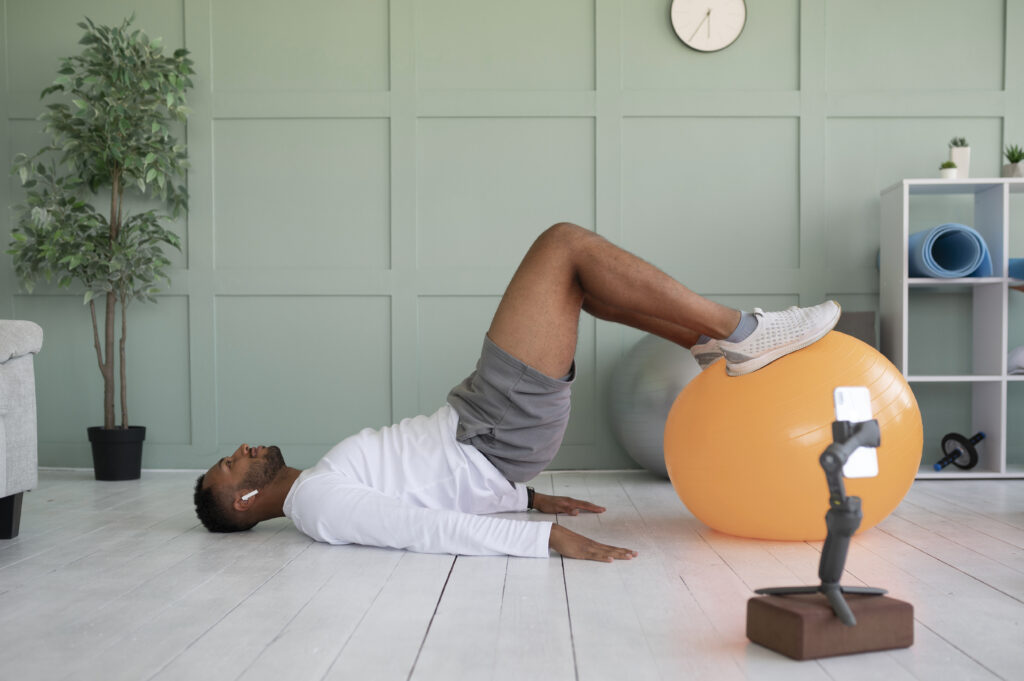A diagnosis of prostate cancer can be overwhelming, but understanding what to expect and how to prepare for prostate surgery can help you feel more confident and in control. At Santis Health, we believe preparation is key to both surgical success and a smoother recovery. Professor Christopher Eden, the UK’s most experienced prostate cancer surgeon, offers invaluable advice for men preparing for robotic radical prostatectomy in this video.
We’ve dedicated this article to guiding you through the practical and proven steps for prostate surgery preparation, from improving your fitness and mental readiness to pelvic floor exercises and key questions to ask your surgical team.
Understanding the procedure
“The structures around the prostate need to be carefully preserved in order to give you the best functional results.”
Robotic radical prostatectomy is a minimally invasive surgery performed that involves the removal of the prostate gland, typically including the seminal vesicles, with careful reconnection of the bladder to the urethra.
A key benefit of this advanced procedure is its nerve-sparing capability. With high-definition magnification and precise robotic instruments, surgeons can avoid damaging the delicate nerves responsible for continence and erectile function. This precision not only improves outcomes but also shortens recovery time.
Understanding the robotic radical prostatectomy steps helps patients make informed decisions and better anticipate the post-operative journey. For details on what happens after surgery, read our guide on “What can I expect during and after robotic radical prostatectomy?”.
Optimising health before surgery
“Stopping smoking before the operation, even for three weeks before, will allow you to recover faster.”
One of the most effective ways of preparing for prostate surgery is by improving your general health. According to Professor Eden, being overweight can make surgery more complex. Excess abdominal fat can limit surgical visibility and increase the risk of complications. If possible, aim to reach a healthy weight in the weeks leading up to your operation.
Another crucial lifestyle change is smoking cessation. Even quitting a few weeks before surgery can significantly reduce the risk of respiratory issues and promote better healing. The NHS stop smoking services offer free tools and support to help.
Fitness and physical conditioning
“If your body is fit, then it is better primed to deal with any significant physical insult, like having a major operation.”
Cardiovascular fitness and muscle strength play a vital role in your recovery from surgery. Engaging in light aerobic activity, such as brisk walking, swimming, or cycling, for at least 30 minutes most days can improve circulation and lung capacity.
Resistance training, even with light weights or bodyweight exercises, helps preserve muscle mass, which can aid mobility post-surgery. A fitter body responds better to anaesthetic and heals more efficiently.
As Professor Eden emphasises in his preoperative preparation video, starting a regular fitness routine, even just weeks before the operation, can make a tangible difference in recovery.
Pelvic floor exercises
“If you have a strong pelvic floor after the operation, it will help your valve of continence to close.”
Learning and practising pelvic floor exercises before prostatectomy is one of the most important steps men can take. These exercises strengthen the muscles that support bladder control, helping to reduce the risk of incontinence after surgery.
Many practitioners will recommend starting pelvic floor exercises as soon as possible. Begin with a comfortable number of repetitions daily, focusing on slow, controlled contractions without engaging the abdominal or thigh muscles. Then as your muscles strengthen, gradually increase the daily repetitions.
YouTube is a great place to start with registered physiotherapists making helpful content. Some hospitals also offer pre-surgery physiotherapy sessions to ensure correct technique.

Mental preparation and support systems
“It is important to maintain a positive mental attitude, but it’s also important to speak up if things aren’t quite right.”
When considering how to prepare for radical prostatectomy, it’s important not to overlook mental readiness. Surgery is not just a physical event, it’s emotional too. Addressing anxiety, setting realistic expectations, and building a support network can ease the psychological burden.
It’s advisable for patients to speak with others who have undergone similar procedures. Peer support groups or one-on-one conversations can offer reassurance and practical insight. Hearing first-hand experiences, both the challenges and the positive outcomes, can help normalise your own emotions and reduce fear of the unknown.
Setting realistic expectations is also vital. While robotic surgery offers high success rates and quicker recovery, it’s important to understand that some side effects, such as urinary leakage or temporary erectile dysfunction, are common and usually improve over time. Recovery is not always linear, some days may feel better than others. Knowing this in advance can help you stay motivated during recovery and reduce frustration if progress feels slow.
What to discuss with your surgeon & anaesthetist
A key part of prostate surgery preparation is having informed conversations with your surgical team. Ask your surgeon about their experience with robotic radical prostatectomy steps, how many procedures have they performed, and what their success rate is with nerve-sparing techniques. Experience matters, especially when it comes to preserving nerves and avoiding complications.
You should also meet with your anaesthetist ahead of time to discuss options. Professor Christopher Eden recommends spinal anaesthesia alongside general anaesthetic. This approach improves pain control and reduces the need for opiates such as morphine, thereby reducing postoperative nausea and facilitating a faster recovery.
Questions you may want to ask:
- Will I be able to eat the day after surgery?
- Is abdominal bloating common?
- What should I expect if I see blood in my urine?
- Is penile or scrotal swelling normal?
- What causes shoulder pain after surgery?
- How can I manage constipation postoperatively?
- Is it normal to feel low energy for a while?
- Can I expect any mood changes during recovery?
Preparing for prostate surgery goes beyond booking an operation date, it involves taking active steps to improve your physical and mental health, understanding the procedure, and building a strong support network.
By following expert guidance from Professor Christopher Eden and the Santis Health team, you can approach your surgery with greater confidence and peace of mind. If you’re ready to take the next step, we invite you to schedule a consultation with us to discuss your options.
For more insight into your recovery journey, read our article on what to expect during and after robotic radical prostatectomy.

